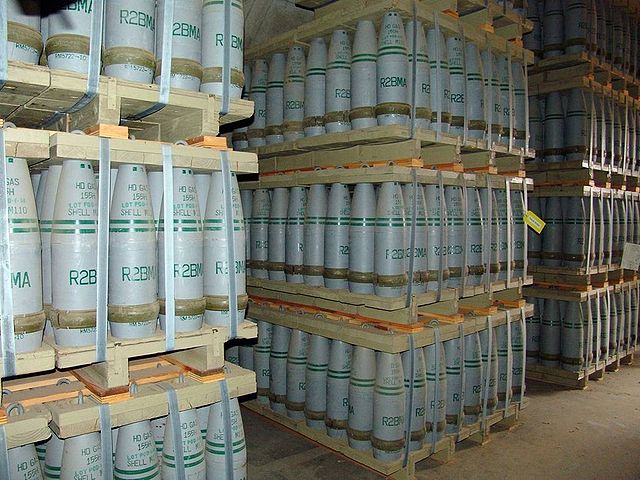During a fierce battle outside the perimeter of the Syrian Armed Forces base at Deir al-Zor, a heavily defended enclave in the heart of ISIS territory in eastern Syria, the Syrian Air Force allegedly dropped unidentified chlorine weapons on the ISIS forces surrounding the base (Associated Press, December 6, 2014):
The Britain-based Syrian Observatory for Human Rights said […] The rebels stormed parts of the base before a counterattack and intense air raids by government forces pushed them back, it added. The group said that some Islamic State fighters had breathing problems in the area after government forces used chlorine gas against them.
Chlorine, while quite lethal in its own right, is a very different (and somewhat more survivable) agent from the sarin nerve gas weapons used by the pro-Assad forces on civilians in August 2013. While the sarin stockpiles are being declared to global inspectors and relinquished, the regime has allegedly continued to drop improvised chlorine-infused barrel bombs from fighters jets to intimidate northwestern villages several times in early 2014. Chlorine barrel bombs are nowhere near as “effective” (i.e. massively fatal) as conventional weapons or regular chemical warheads like those used in March and August 2013.
Additionally there is probably not a lot of sympathy to be found for ISIS combatants exposed to chlorine attacks, in light of their own likely use of chemical IEDs in Iraq (New York Times, October 23, 2014):
Unconfirmed reports of improvised bombs made with chlorine gas and used by militants have arisen from time to time since the Islamic State began seizing territory in Iraq at the beginning of the year, raising concerns that Iraq’s old chemical weapons stores had fallen into the militants’ hands.
The weapons referred to above, as summarized here, are the really old rusty ones from before the first Gulf War. However, while largely unusable as intended, some of the ingredients in them can be re-purposed into IED additives. Additionally, chlorine (which was not discussed in the major Times investigation) is not just used in weapons and is thus far more readily available as an ingredient than other chemical weapons agents.
ISIS allegedly detonated a chlorine-filled IED in September against Iraqi police officers (Washington Post, October 23, 2014):
The police officers, all members of the Sunni Jabbour tribe, which has turned against the Islamic State, were guarding a line in the town’s north. After an exchange of fire, they said, they were surprised to see Islamic State fighters retreating from their position about 150 yards away.
Suddenly there was a boom in the area the extremists had just vacated, said Lt. Khairalla al-Jabbouri, 31, one of the survivors. “It was a strange explosion. We saw a yellow smoke in the sky,” he said. The wind carried the fog toward their lines. The men say it hung close to the ground, consistent with the properties of chlorine gas, which is heavier than air.
“I felt suffocated,” Jabbouri recalled. “I was throwing up and couldn’t breathe.”
Another officer, Ammer Jassim Mohammed, 31, who suffers from asthma, said he passed out within minutes.
Other minor ISIS chemical IED attacks in Iraq have also been reported. There are also allegations that ISIS used some other type of chemical agent in Kobani.
Regardless, it sounds very much like both ISIS and the Syrian Armed Forces are using makeshift chlorine weapons for dramatic effect (though not necessarily for battlefield utility) — and now one is simply using it on the other. Not a lot of tears will be shed for ISIS fighters exposed to what is essentially their own directly proportional chemical comeuppance.

Pallets of 155 mm chemical weapons artillery shells (sulfur mustard in this photo). (Credit: US Army via Wikipedia.)


